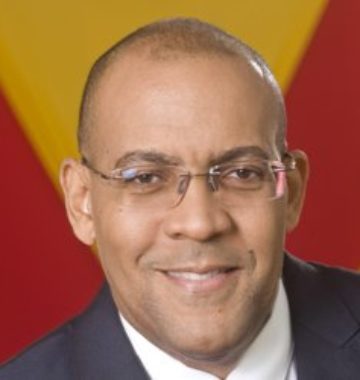Capital: Bridgetown
Official Language: English
Status: Independent 30 November 1966
Area: 431 sq Km, 166,4 sq Mi
Population: 272,112 (2010)
Currency: Barbadian dollar (BBD)
Motto: Pride and Industry
Barbados is one of the Caribbean’s leading tourist destinations and is one of the most developed islands in the region, despite it actually being classed as an Atlantic Island, with an HDI number of 0.825. In 2011 Barbados ranked 2nd in the Americas (16th globally) on Transparency International’s Corruption Perception Index, behind Canada. Barbados is outside of the principal Atlantic hurricane belt. The economy remained heavily dependent on sugar, rum, and molasses production through most of the 20th century. In the 1990s, tourism and manufacturing surpassed the sugar industry in economic importance.

Tel: 246 535 7734 / 246 535 7709
Email: kerrie.symmonds@barbados.gov.bb
Trinity Business Centre
Country Road
Bridgetown Barbados
Permanent Secretary (Special Assignment)
Ministry of Energy and Water Resources
Tel: 246 535 2530 / 246 535 2531
Email: andrew.gittens@barbados.gov.bb
Barbados is the most easterly of the Caribbean islands. It is located approximately 120 km (75 mi) from Saint Lucia and 300km (200mi) northeast from Trinidad and Tobago. It is primarily low-lying, with some higher areas in the island’s interior.
First sighted by the Portuguese but settled by the English in 1627 and remained a British Colony until independence in 1966. The Barbados House of Assembly is the third oldest legislature in the Americas, dating from 1639.
Tourism is the main industry of this broad-based economy. The off-shore finance and informatics are also important foreign exchange earners. There is also a light manufacturing sector which is focused mainly on the local market although there is some exporting to other Caribbean countries. The products include foodstuff, beer, flour, animal feeds and chemicals. The main agro-industries are sugar refining and rum distilling, each with substantial export production.
In food production, this country is self-sufficient in eggs and almost self-sufficient in chicken. Locally produced pork, beef and lamb supply is a significant proportion of the domestic market.
Grantley Adams International (Christ Church)
Business hours:
Commercial 8:00 a.m. to 4:00 p.m. Monday to Friday.
8:00 a.m. to 1:00 p.m. Saturday.
Governments: 8:15 am to 4:30 pm Monday to Friday.
New Year’s Day, January 1; Errol Barrow Day, January 21; Good Friday; Easter Monday; National Heroes’; Day, April 28; Labour Day May 1; Whit Monday (around June);Emancipation Day, August 1; Kadooment Day; first Monday in August; Independence Day, November 30; Christmas Day, December 25; Boxing Day, December 26. Holidays that fall on a Sunday are observed the following Monday.
1 August, 1973
Blue – Sea and sky
Gold – The sands
Brittania’s Trident – The shaft of the trident is broken as an indication of the break with the historical and constitutional ties of the past